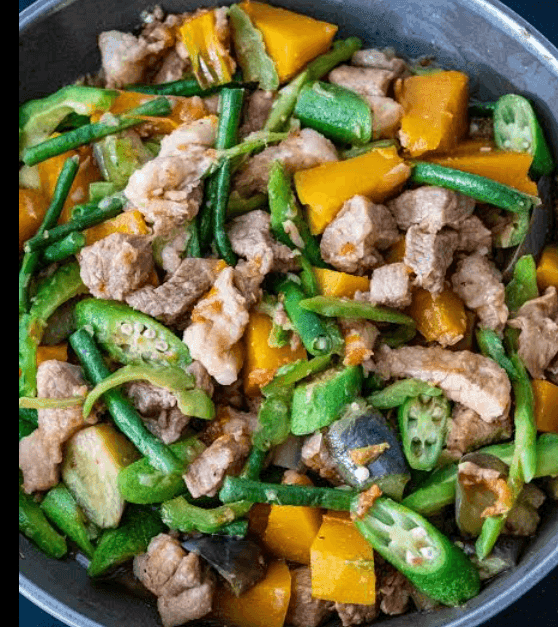Pork Pinakbet is a traditional Filipino dish made with pork and a variety of vegetables, simmered in a savory sauce that usually includes shrimp paste (bagoong).
Chefadora AI has the answer - timers, swaps, step-by-step help.
In a large pot or pan, heat the vegetable oil over medium heat.
Add the chopped onion and sauté until translucent. Then, add the minced garlic and chopped tomato, cooking until the tomatoes soften.
Add the pork chunks to the pot. Cook until the pork is browned on all sides.
Pour in water and let it simmer. This will help tenderize the pork. Cover the pot and let it cook for about 20-30 minutes, or until the pork is tender.
Stir in the shrimp paste (bagoong) and mix well. Adjust the amount according to your taste preference.
Add the eggplant, string beans, and squash (if using). Stir gently and let the vegetables cook until they are tender.
Allow the dish to simmer for another 5-10 minutes. If using bitter melon, add it during the last few minutes of cooking, as it cooks quickly.
Taste and season with salt and pepper as needed.
Once everything is cooked through, remove the pot from heat. Serve hot with steamed rice. Garnish with fresh herbs if desired.
Adjust the amount of shrimp paste according to your taste preference.
Add bitter melon during the last few minutes of cooking, as it cooks quickly.
What is the cooking process for making Pork Pinakbet?
To make Pork Pinakbet, start by heating vegetable oil in a large pot over medium heat. Sauté chopped onions until translucent, then add minced garlic and chopped tomatoes until softened. Brown the pork chunks, then add water and let it simmer for 20-30 minutes until the pork is tender. Stir in shrimp paste, followed by the vegetables like eggplant, string beans, and optional squash. Simmer for an additional 5-10 minutes, season with salt and pepper, and serve hot with steamed rice.
Is Pork Pinakbet suitable for specific dietary needs?
Pork Pinakbet is not inherently gluten-free due to the shrimp paste (bagoong), which may contain gluten. However, you can make it gluten-free by using a gluten-free shrimp paste or omitting it altogether. Additionally, it can be made low-carb by reducing the amount of squash and avoiding starchy vegetables. For a vegetarian version, substitute the pork with tofu or mushrooms and use a plant-based shrimp paste.
What can I substitute for shrimp paste in Pork Pinakbet?
If you don't have shrimp paste (bagoong) on hand, you can substitute it with fish sauce or soy sauce for a similar umami flavor. For a vegetarian option, consider using miso paste or a combination of soy sauce and a bit of sugar to mimic the sweetness of shrimp paste.
How should I store leftover Pork Pinakbet?
Leftover Pork Pinakbet can be stored in an airtight container in the refrigerator for up to 3-4 days. To reheat, simply warm it on the stove over low heat or in the microwave until heated through. If you want to store it for a longer period, consider freezing it for up to 3 months. Just make sure to let it cool completely before transferring it to a freezer-safe container.
What side dishes pair well with Pork Pinakbet?
Pork Pinakbet is best served with steamed rice, which complements its savory flavors. You can also pair it with a side of pickled vegetables or a simple green salad to balance the richness of the dish. For a more traditional Filipino meal, serve it alongside other dishes like fried fish or grilled meats.
